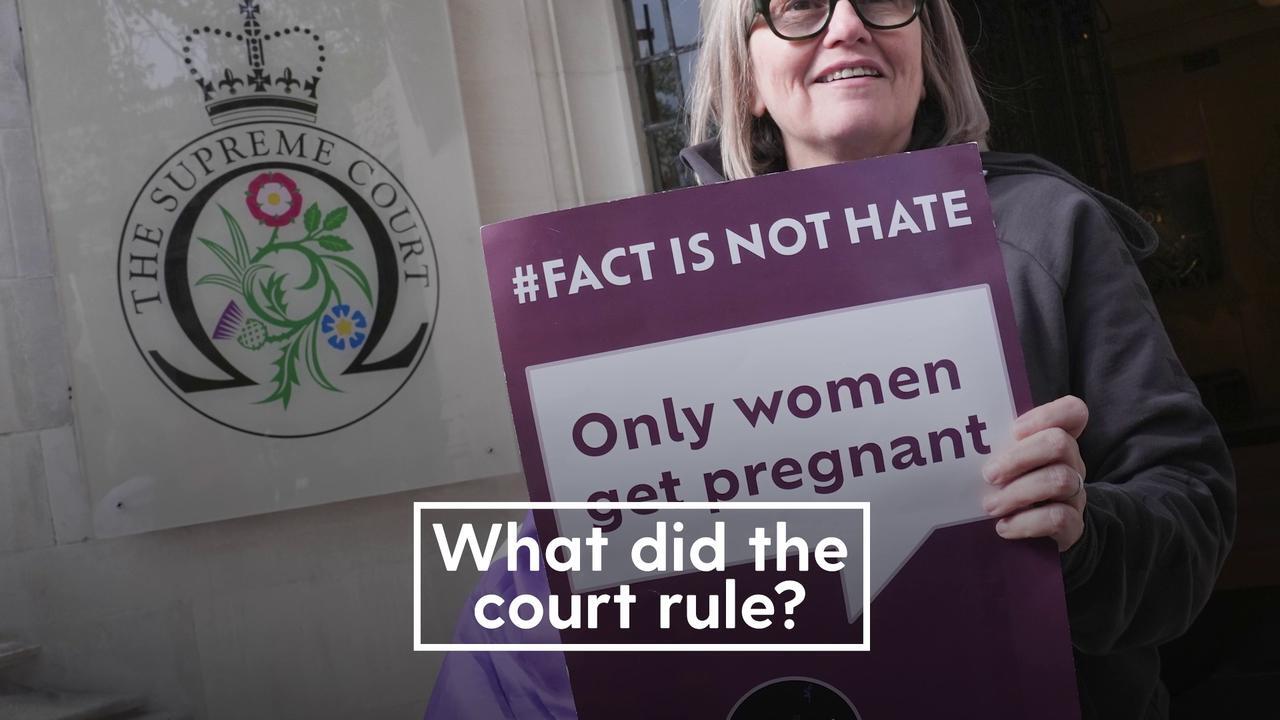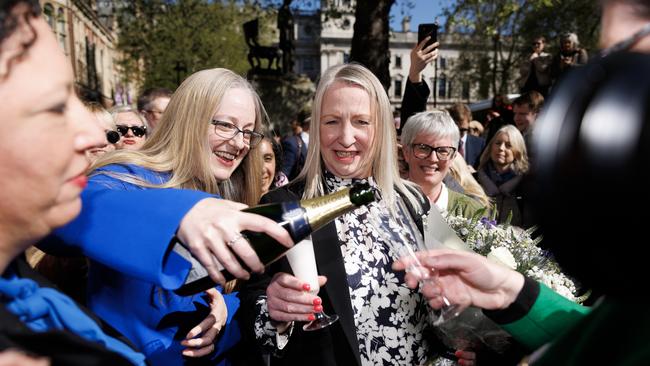UK court rules a woman is ‘a biological female’
JK Rowling hailed the dramatic legal judgment, saying it will protect the rights of women and girls across the UK.

In a dramatic legal judgment, the British Supreme Court has ruled that a woman is “a biological female”.
The court has ruled that, legally, men with gender certificates saying they are a woman – in some cases self-proclaimed without any medical authority – are not women.
Women’s groups across Britain immediate hailed the “commonsense” ruling.
Sex Matters said: “The court has given the right answer: the protected characteristic of sex – male and female – refers to reality, not paperwork.”
For Women Scotland, the campaigning group that took the case through the courts for the past seven years, said it was “absolutely jubilant”.
In a statement, the group said: “This is a landmark victory, not just for For Women Scotland, but for every woman who has been told to sit down, shut up, and make way. It puts a clear boundary around what it means to be female in law and pushes back against a men’s rights movement that has tried to colonise womanhood.”
Supreme Court president Lord Patrick Hodge, who led a five-judge appeal on the issue, said on Wednesday: “The unanimous decision of this court is that the definition of the terms woman and sex in the Equality Act 2010 refer to a biological woman and biological sex.”
He said transgender people still had protection against discrimination and harassment under the Equality Act.

He said: “We counsel against reading this judgment as a triumph of one or more groups in our society at the expense of another. It is not.
“The Equality Act 2010 gives transgender people protection not only against discrimination through the protected characteristic of gender reassignment, but also against direct discrimination, indirect discrimination and harassment in their acquired gender.”
The landmark ruling is a huge setback for the Scottish government, which characterised women as anyone who thought they were women, as well as those who held a gender reassignment certificate – referred to in the court as “certifiable sex”.

The Scottish government had wanted to categorise biological men who said they were women as being a female under the requirement to have 50 per cent of women on government boards.
The historic judgment opens the way for females to have protected spaces such as change rooms, sporting competitions and single-sex medical wards, and legally disallows men who claim to be women from entering women’s spaces. It also impacts on equal pay claims and maternity policies.
Broadly, the ruling means “sex” refers to biological sex – the XX (female) and XY (male) chromosomes people are born with – and is not “certificated sex”, referring to the gender people feel they are.
In its court submission, For Women Scotland director Trina Budge said: “Not tying the definition of sex to its ordinary meaning means that public boards could conceivably comprise of 50 per cent men, and 50 per cent men with certificates, yet still lawfully meet the targets for female representation.
“However, the ramifications … are much more far-reaching … The stakes are high and the court’s decision will have consequences for everyday, single-sex services such as toilets and hospital wards.”

The appeal judges said that interpreting sex as “certificated sex” would cut across the definitions of man and woman in the Equality Act and would instead create an “incoherent” interpretation of the act.
Australian courts may look at the British judgment closely, particularly in light of the recent Federal Court “Tickle v Giggle” decision where transgender person Roxanne Tickle was ruled to have been discriminated against based on gender identity in wanting to access the women’s-only site called Giggle.
The British appeal judges have firmly rejected the suggestion that male and female words bear a “variable meaning”, saying to do so would weaken protections given to those with protections such as interfering with the ability to have lesbian only spaces and female only associations.
Outside the court, Sex Matters chief executive Maya Forstater said the ruling now meant “gender self-ID is dead”.
After hugging other supporters she said: “Everyone is going to have to pay attention to this, this is from the highest court in the land. It’s saying sex in the Equality Act is biological sex. Self-ID is dead.”

One of Scotland’s fiercest supporters of female sex based rights, the Harry Potter author JK Rowling, hailed the ruling saying it would protect the rights of women and girls across the UK. She said: “It took three extraordinary, tenacious Scottish women with an army behind them to get this case heard by the Supreme Court and, in winning, they’ve protected the rights of women and girls across the UK. For Women Scotland, I’m so proud to know you.”
Winners in the UK Supreme Court today:
— J.K. Rowling (@jk_rowling) April 16, 2025
Women and girls, including trans-identified women (continue to benefit from maternity rights etc)
Gay people
Freedom of speech
Freedom of association
Those at risk of discrimination for a belief in the material reality of sex.
1/2
But a transgender charity called Mermaids, which has a controversial activist history, joined other pro trans groups saying the Supreme Court decision could have “widespread, harmful implications”
Amnesty International chief executive Sach Deshmukh was also critical. “The outcome of today’s judgment is clearly disappointing,“ she said. ” It is a long and complex judgment, and we will take time to analyse its full implications.“
The ramifications have political leanings beyond the Scottish parliament, with the British Labour Party having to backtrack.
Tory leader Kemi Badenoch said the ruling meant that the “era of Keir Starmer telling us women can have penises has come to an end”.

Independent MP Rosie Duffield who resigned from the Labour Party after repeated clashes with Sir Keir also said the Labour Party had been gaslighting women.
It’s a load of gaslighting, to put it politely,” she told Times Radio. “I mean, the Labour Party have actively blocked women from promotion, women from standing as councillors and politicians in the last, you know, five, 10 years.
“If we’ve shown the remotest sort of sliver of questioning trans rights to enter our spaces and self-certificated or self-ID’d men to kind of infiltrate hospital wards … some women have paid a heavy price.“
Another prominent womens campaigner, tennis star Martina Navratilova said “we women knew who we were all along”.
She added: “Thank you to all who fought for this for years.”
Another women’s advocate the former British swim star Sharron Davies hailed that single sex spaces have been clarified in law, as a biological single sex spaces “including sport, changing rooms, rape crisis centres and prisons”.
She said: “It was always madness to suggest a £6 piece of paper changed a biological reality, which affects so many rights and safeguards.”



